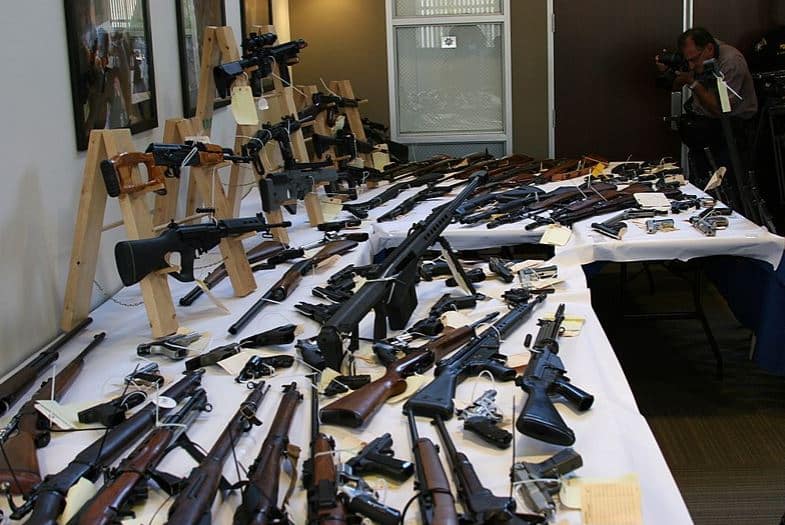Mexican Government Sues Gunmakers For Contributing to Drug Cartel Violence

The Mexican government this week filed a lawsuit accusing U.S. gunmakers of helping to fuel violence by drug cartels and other criminals who encounter few impediments to acquiring the firearms.
The lawsuit filed in federal court in Massachusetts says companies like Smith & Wesson Brands Inc. could prevent some of the illegal cross-border gun trafficking but instead are too focused on profits.
“Defendants use this head-in-the-sand approach to deny responsibility while knowingly profiting from the criminal trade,” the lawsuit says.
Other defendants are Barrett Firearms Manufacturing Inc., Beretta USA Corp., Colt’s Manufacturing Company LLC and Glock Inc.
The lawsuit says about a half-million guns a year are smuggled from the United States into Mexico, roughly two-thirds of them made by the defendants.
“Their policy is to sell to any distributor or dealer that has a U.S. license to buy and sell the product, regardless of the buyer’s record of flouting the law and despite blazing red flags indicating that a gun dealer is conspiring with straw purchasers or others to traffic defendants’ guns into Mexico,” the lawsuit says.
Mexican officials who announced the lawsuit estimated their damages at $10 billion, which included about 17,000 murders in 2019 alone. They added that violence traced to the American-made guns could be credited with a 1.7% reduction in gross domestic product.
They filed the lawsuit in Massachusetts because of gun manufacturers headquartered in the state.
The National Shooting Sports Foundation Inc. responded to the lawsuit with a statement saying Mexico needs to blame itself for gun crimes.
“The Mexican government is responsible for the rampant crime and corruption within their own borders,” a National Shooting Sports Foundation statement says.
Some of the violence could be traced to guns stolen by drug cartels from Mexican police and its military, the gun rights organization says.
The Mexican lawsuit is based on a unique legal strategy for avoiding liability limits of the 2005 federal Protection of Lawful Commerce in Arms Act.
The law derived from Second Amendment rights protects firearms manufacturers and dealers from liability when crimes are committed with their products. They are liable in lawsuits only if their guns are defective, they engage in criminal behavior or they breach their contract obligations.
Their liability is essentially the same as any other consumer product manufacturer. The exception would be if they entrust their guns to persons they believe will use them to commit a crime.
The Mexican lawsuit says the American manufacturers cannot invoke Protection of Lawful Commerce in Arms Act liability limits because their guns caused injuries in Mexico.
“[The PLCAA] does not apply because it bars certain claims against gun manufacturers and distributors only when the injury occurred in the U.S. and the criminal’s misuse of the gun was unlawful under U.S. domestic law,” the lawsuit says.
“The government’s injuries here occur in Mexico, and its claims result from unlawful misuse of guns in Mexico, not in the U.S. Every aspect of PLCAA confirms that the U.S. Congress enacted that statute with only U.S. domestic concerns in mind,” it adds.
In one example, the lawsuit mentions the Colt .38-caliber “Emiliano Zapata 1911” pistol, which is engraved with the image of the Mexican revolutionary. It is a status symbol among drug cartel members.
The lawsuit alleges the gunmakers negligently designed the guns in a way that makes them easy to modify for automatic fire, similar to military assault weapons.
“Military-style weapons are useful for killing large numbers of people in a short amount of time, taking on well-armed military or police forces and intimidating and terrorizing people,” the lawsuit says. “The manufacturer defendants designed their assault weapons to be effective people-killing machines.”
The plaintiffs allege negligence, gross negligence, public nuisance, defective design and unjust enrichment. The lawsuit seeks unspecified compensatory and punitive damages.
Other gun lawsuits in recent years imply there is likely to be a small amount of court precedent to support the Mexican claim.
Remington Arms Co. recently offered to pay nearly $33 million to settle lawsuits by families of children killed during the 2012 Sandy Hook school massacre in Connecticut. Twenty-six people were killed.
The families that sued said Remington’s marketing of firearms contributed to the massacre.
The court case is Estados Unidos Mexicanos v. Smith & Wesson Brands Inc. et al., case number 1:21-cv-11269, in the U.S. District Court for the District of Massachusetts.























